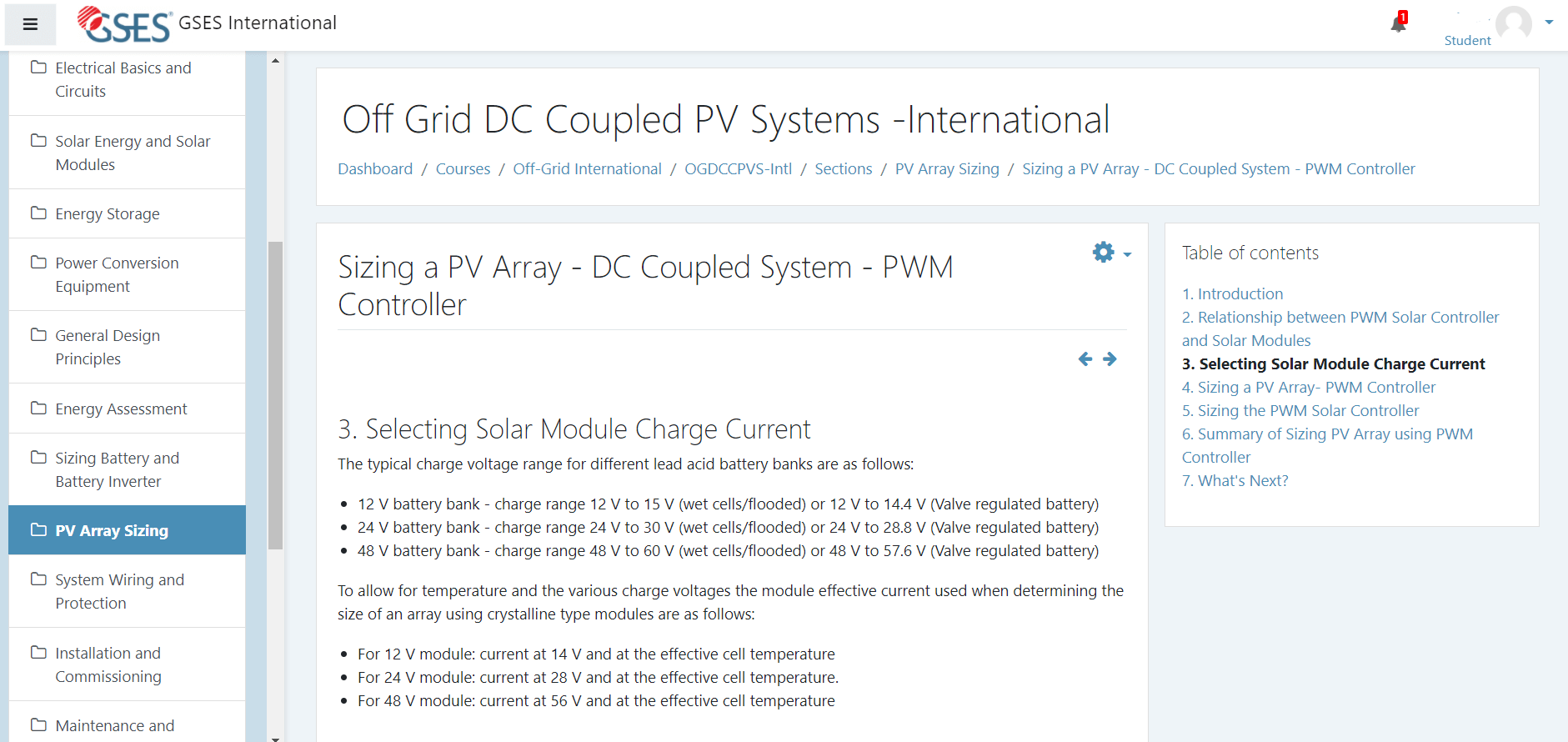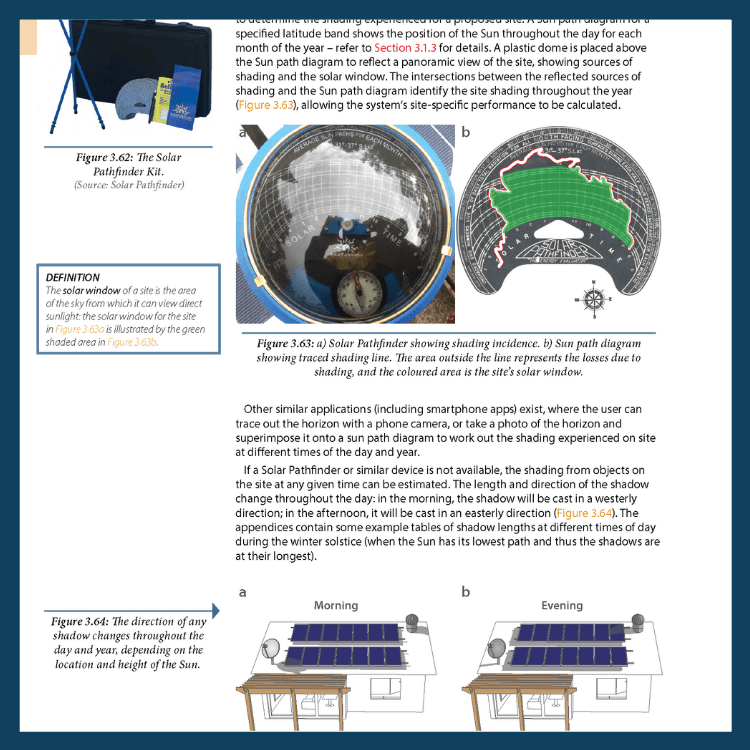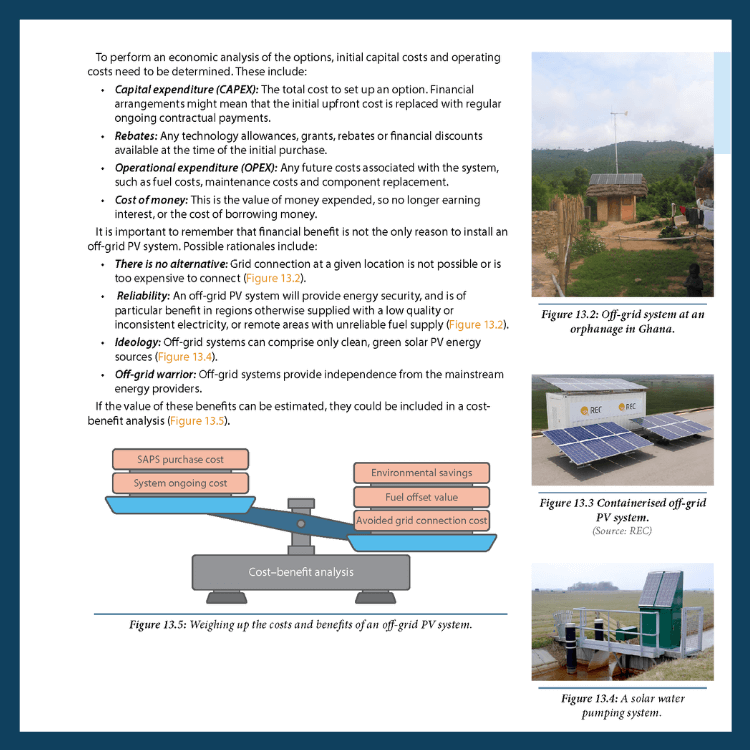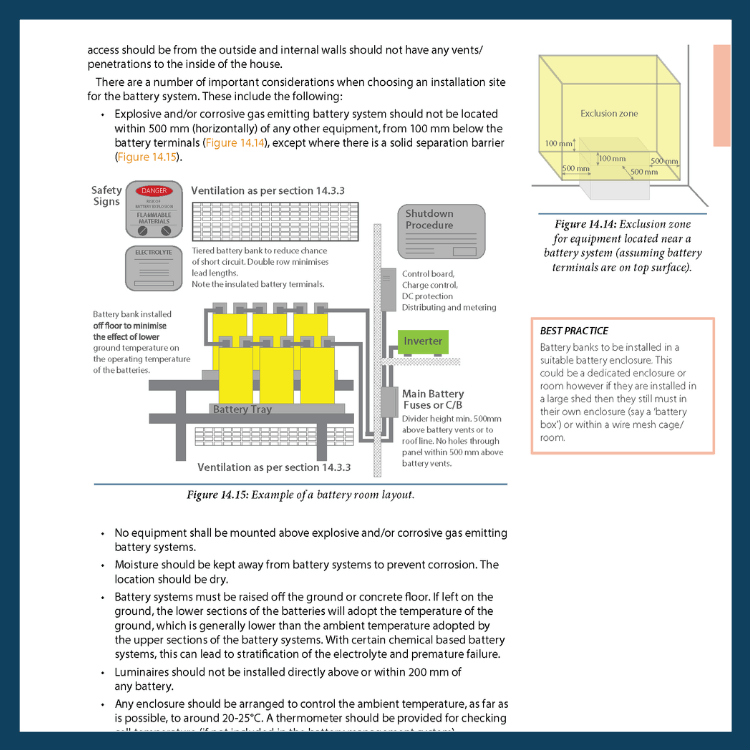Off-Grid Solar Systems: DC Coupled Design & Installation
AUD 155.00
Power up remote areas and your career by studying DC Coupled Solar Systems.
DC Coupled Off-Grid Solar Systems usually have a system voltage of 12, 24, or 48V and power smaller DC appliances. They are generally used in remote areas for lighting, cooking, and more.
You can bring power to remote homes and businesses by learning:
- To design Off-Grid Solar Systems from Pico Solar (1 small panel) to Solar Home Systems with multiple solar panels, a solar controller, and batteries.
- Installation theory of how the equipment is installed to meet relevant international standards and industry best practices.
The course is based on the (IEC) Standard: IEC62548: Installation of PV Arrays, used in 170+ Countries. This standard is recommended, but not required for this course. In addition, this course contains best practices based on the Australian Standards and GSES guidelines for the Pacific Islands and West Africa.
How You Will Learn:
Start anytime, finish within 1 year!
- Our courses are self-paced, so you can work on your own time anytime.
- Work through the online material with your Resource Book.
- Watch videos, practice solving problems and complete the quiz at the end of each chapter.
If you need extra help, contact our expert tutor team at GSES!
How to start learning:
Purchase the course with the students’ name and email as you want it spelled on the certificate. Please allow for 1- Business Day for our team to enroll the student and send login instructions.
This course includes the following resource Ebook:
International Off-Grid PV System Design Ebook
Students that already have access to the Ebook should contact GSES before the purchase.
Prerequisites
As a minimum GSES recommends that before registering for the course you should have the following skills:
- Some knowledge of safe work practices;
- Minimum Senior Secondary School Math (or in-country equivalent) skills for solving standard problems; and
- Minimum Senior Secondary School English (or in-country equivalent) and reading skills.
All course participants must be able to read and understand English.
It is preferred that the participants already have knowledge and skills in:
- Electricity, electrical terms, and common formulae;
- Working knowledge of tools and meters used in installation and maintenance of electrical systems; and
- Basic customer education and service practices.
Though having these skills is preferred, the attendees can learn some of these skills during the online course or with extra work while completing the course.
Learning Outcomes
This course has the following learning outcomes:
Designer of Off-Grid DC Coupled PV systems
- Knowledge of Occupational Health and Safety
- Understanding Energy Concepts
- Undertaking Energy and Site Assessment
- Understanding System Components
- Understanding System Design
- Interpreting Technical Standards and Regulatory requirements
- Developing Documentation
Installer of Off-Grid DC Coupled PV systems
- Working Safely with Off-grid PV Power Systems including PV/Fuel Generator Hybrids
- Understanding Energy Concepts
- Understanding System Cabling and System Protection Devices
- Understanding installation requirements of the different components of the system
- What Testing and Commissioning should be undertaken.
The learning outcomes are based on the following training unit standards that are accredited under the Pacific Islands Education Qualifications and Assessments Programme:
- Designer of Solar Based Off-Grid Power Systems – (Solar Home Systems)
- Designer of Solar Based Off-Grid Power Systems – (d.c. and a.c. loads)
- Excluding the sections covering AC coupled Systems
- Installer of Solar Based Off-Grid Power Systems – (d.c. loads)
- Installer of Solar Based Off-Grid Power Systems (d.c. and a.c. loads)
- Excluding the sections covering AC coupled Systems
However, the course does not include a practical hands-on installation session, it is only the theory of installation that is covered, and no assessment is undertaken on the practical skills of the student in installing a system.
Delivery Method and Duration
This course is delivered online at students’ own pace. GSES has a team of tutors who mark the online work, and as necessary, supply feedback or additional technical information to the students. GSES’s tutors are also available to be contacted by phone during business hours or by email.
The course is expected to take between 60-100 hours to complete, although this will vary between students.
Online course access is valid for 12 months and will expire afterward. The E-book does not expire.
A computer with an internet connection and a free Adobe Account is required to access the materials. Refer to the E-Book Page for more information.
Detailed Course Contents
- Workplace Health & Safety
- International Practice
- Developing a WH&S Procedure
- On-site Risk Assessment
- Electrical Basics and Circuits
- Introduction to Electrical Circuits
- Characteristics of DC Electricity
- Characteristics of AC Electricity
- Energy Conversion
- Electrical Circuits
- Working with Electricity
- Solar Radiation
- Variation in Solar Radiation
- Measuring Solar Radiation
- Capturing Solar Radiation
- PV Cells and Modules
- How a PV Cell Works
- PV Cell Electrical Characteristics
- PV Modules
- Quantifying PV Module Performance
- Types of PV Modules Technology
- PV Module Protection
- Module Reliability
- PV Module Specifications
- PV Array Efficiency and Output
- Losses
- Output of a PV Array
- Energy Storage
- Battery Characteristics
- Battery Technologies
- Lead Acid Batteries
- Lithium-Ion Batteries
- Other Battery Technologies
- Combining Batteries
- Battery Control Systems
- Other Energy Storage Technologies
- Safe Handling and Disposal
- Power Conversion Equipment Off-Grid DC Coupled PV Systems
- DC to DC Conversion: System Controllers & Regulators.
- DC to AC Conversion: Inverters
- Inverter Output Waveform
- Stand Alone Inverters
- Separated and Non-Separated Inverters
- Inverter Protection Circuits
- Inverter Power
- Inverter Programming
- General Design Principles DC Coupled PV systems
- Design Process
- Determine System Configuration
- Design Finalisation
- Drawings
- Energy Assessment
- Load Assessment
- Load Management
- Heating and Cooling
- Hot Water
- Lighting
- Other Appliances
- Sizing a Battery Inverter – DC Coupled PV System
- Using a Load (Energy) Assessment Table for Determining Battery and Inverter Capacity
- Selecting and Sizing the Battery Inverter
- Sizing a Battery – DC Coupled PV System
- Using a Load (Energy) Assessment Table for Determining Battery and Inverter Capacity
- Total Daily Energy Use
- Battery Technology
- Battery Capacity
- Summary of Selecting the Correct Battery
- PV Array Sizing
- DC Coupled Systems
- Sizing a PV Array – DC Coupled Systems-PWM Controller
- Sizing a PV Array – DC Coupled Systems-MPPT Controller
- Cable Selection and Sizing
- Cable Selection and Sizing
- Line Losses (Voltage Drop)
- Current Carrying Capacity
- Fault Current Cable Sizing
- Protection and Disconnection (Isolation)
- Types of Protection Devices
- PV Overcurrent Protection
- Battery Cable Protection Requirements in an Off-Grid DC Coupled PV System
- DC Load Sub Circuit Protection
- Location of Protection for DC Coupled Systems
- PV Array Disconnection Devices
- Other System Disconnection
- Earthing (Grounding)
- PV System Earthing (grounding)
- Battery System Earthing (grounding)
- Lightning Protection
- Installation Off Grid DC Coupled PV Systems
- Commissioning and Documentation Off Grid DC Coupled PV System
- Signage
- Commissioning
- System Documentation
- Maintenance and Troubleshooting
- Maintenance Schedule and Log Books
- Shutdown Procedure
- Maintenance of Components
- System Modelling
- Principles of Modelling
- Design Tools
- Performance Modelling
- Operational Modelling
- Economics
- Initial System Cost
- Off – Grid PV System Rebates
- Ongoing Costs of Off – Grid DC Coupled PV systems
- Life Cycle Cost Analysis
- Levelised Cost of Electricity
Assessments and Certificate
Online Quizzes
At the end of each session there are a few optional exercises for students to practical before attempting a quiz.
At the end of each session there are compulsory assessments. Each student is allowed four attempts of completing the quiz. The student must obtain 100% in each of these quizzes to complete the course.
Certificate
After successfully completing all online quizzes the student will be awarded a certificate from GSES that states:
Name of Person
Had successfully completed the course titled
IEC Off-Grid Solar Systems: DC Coupled Design & Installation
And has been deemed competent in:
Design of Off-Grid PV Systems DC Coupled Design
Cancellation and Refunds
Cancellation of online training courses will be subject to the following conditions:
- Cancellation of online training courses made within fourteen (14) days of the date of payment AND before the online course has been accessed: the student will receive a full refund of the online course payment.
- Cancellation more than fourteen (14) days after the date of payment OR after the online course has been accessed (whichever occurs first): the student will receive no refund.
- All course refunds are exclusive of the price of the supplied course publication as advertised at the time of enrolment. GSES reserves the right to refuse a refund of the publication on the basis that goods are damaged or have been used prior to return.
E-Book Activation
This course includes your Resource E-Book. The checkout page and your order confirmation email will include a download link. Please ensure you enter the correct email for delivery.
This e-Book is only accessed by the free reader Adobe Digital Editions which you can download here for Windows, Macintosh the App Store , or Google Play.
You can authorize your computer or make a free Adobe ID account.
Once Adobe Digital Editions is installed, click on your downloaded eBook file and Digital Editions will open your eBook!
If you do not receive this email, or are having problems please contact us on +61 2 9024 5312 or email: info@gses.com.au








